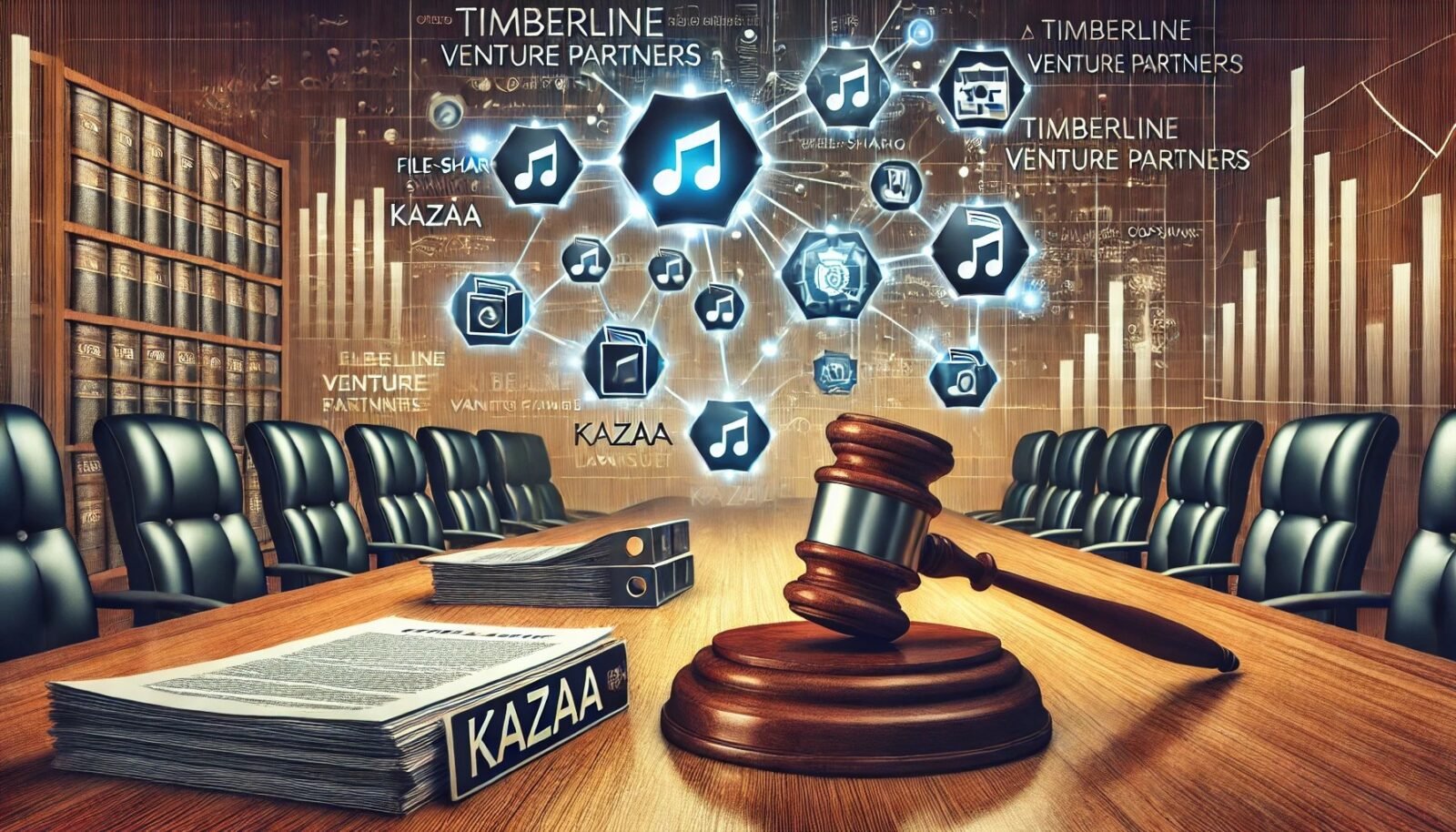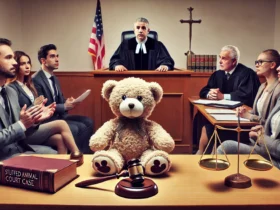Introduction to Timberline Venture Partners and Kazaa
Timberline Venture Partners is a venture capital firm that invests in technology companies. It helps startups by providing funding and resources. Over the years, Timberline Venture Partners has supported several tech companies to grow and succeed.
Kazaa was a popular file-sharing platform launched in the early 2000s. It allowed users to share and download music, videos, and other files online. Kazaa became famous for being one of the most widely used platforms for downloading content, but it also faced legal issues due to copyright infringement claims.
The connection between Timberline Venture Partners and Kazaa comes from Timberline Venture Partners being involved in the investment or funding of Kazaa. This partnership led to legal challenges that are central to the lawsuit involving both parties.
The Lawsuit: Origins and Key Details
Events That Led to the Lawsuit Involving Timberline Venture Partners and Kazaa
The lawsuit involving Timberline Venture Partners and Kazaa started due to the legal issues surrounding Kazaa’s file-sharing platform. Kazaa allowed users to share copyrighted music, movies, and software, which led to claims of copyright violations. As the platform grew in popularity, media companies and copyright holders began to take legal action against Kazaa, seeking compensation for the unauthorized distribution of their content.
The Role of Timberline Venture Partners in Funding or Supporting Kazaa
Timberline Venture Partners Lawsuit Kazaa played a role in the growth of Kazaa by providing funding and support. As a venture capital firm, they invested in Kazaa, which helped the platform expand and reach more users. Their financial involvement became a focal point in the lawsuit, as some claimed that Timberline Venture Partners may have indirectly supported the platform’s illegal activities through their investments.
Specific Allegations or Accusations in the Lawsuit
The lawsuit against Kazaa and Timberline Venture Partners included allegations of copyright infringement. Kazaa was accused of facilitating the illegal distribution of copyrighted material, while Timberline Venture Partners faced accusations of aiding and supporting the platform financially, thus contributing to the violations. The legal case centered around whether Timberline Venture Partners should be held accountable for the actions of Kazaa due to their financial involvement.
Legal Grounds for the Kazaa Lawsuit
Intellectual Property Issues Surrounding Kazaa
Kazaa, a peer-to-peer file-sharing service, has been at the center of legal disputes regarding the unauthorized sharing of copyrighted material. The service allowed users to share and download music, movies, and other digital content, raising significant concerns among copyright holders, including music labels and artists. These stakeholders argued that Kazaa violated their intellectual property rights, leading to extensive litigation.
Claims Related to File-Sharing and Copyright Infringement
The primary legal claims against Kazaa revolved around copyright infringement and file-sharing practices. Copyright holders initiated lawsuits, claiming that Kazaa’s platform facilitated the illegal distribution of their protected works. Notably, cases referenced the Digital Millennium Copyright Act (DMCA), which outlines the responsibilities of online service providers in preventing copyright infringement. The arguments often focused on contributory infringement, asserting that Kazaa knowingly allowed and benefited from the illegal sharing of copyrighted materials.
Financial Disputes or Investment-Related Matters in the Lawsuit
The lawsuits against Kazaa had significant financial implications for the company. This included potential settlements and penalties that could impact its revenue and operations. Furthermore, the legal challenges raised concerns among investors and stakeholders about the sustainability of Kazaa’s business model in a rapidly evolving digital landscape. These disputes prompted discussions about the valuation of Kazaa and its future prospects amid ongoing legal scrutiny.
Timeline of the Kazaa Lawsuit
When the Legal Action Began
- 2001: Legal action against Kazaa began when several major record labels, including the Recording Industry Association of America (RIAA), filed lawsuits alleging copyright infringement due to unauthorized sharing of music via the Kazaa platform.
Key Dates in the Case
- September 2003: A significant ruling by the Australian Federal Court found Kazaa’s operators liable for copyright infringement, marking a pivotal moment in the legal battle.
- February 2004: Kazaa’s parent company, Sharman Networks, reached a settlement with several major record labels, agreeing to pay $100 million and implement measures to curb copyright infringement on its platform.
Major Milestones in the Lawsuit
- April 2004: A U.S. district court dismissed claims against Kazaa by the RIAA, stating that the service was protected under the DMCA’s safe harbor provisions, but the ruling did not absolve the company of all liability.
- October 2005: A settlement was reached with the Australian music industry, leading to Kazaa’s implementation of a music licensing agreement to legally distribute music.
- 2006: Kazaa began transitioning its platform to a legal model, offering licensed content to comply with copyright laws and mitigate further legal risks.
Statements from Timberline Venture Partners
Defense or Response Regarding the Lawsuit
Timberline Venture Partners, an early investor in Kazaa, issued statements emphasizing their commitment to upholding intellectual property rights while defending their investment in the company. They argued that Kazaa’s platform was designed to facilitate user-generated content sharing and that the responsibility for copyright infringement lay primarily with the users, not the service provider. The firm expressed confidence in Kazaa’s legal strategies and its ability to navigate the evolving landscape of digital rights.
Public Statements or Interviews about the Kazaa Controversy
In various public statements and interviews, representatives from Timberline Venture Partners highlighted the transformative potential of peer-to-peer technology, asserting that it could revolutionize how content is distributed and consumed. They acknowledged the challenges posed by copyright infringement but maintained that Kazaa was exploring options to adapt to legal requirements while continuing to innovate.
Timberline’s spokespeople also mentioned their support for licensing agreements and compliance measures, emphasizing that they were working collaboratively with industry stakeholders to find solutions that would benefit both creators and consumers in the digital marketplace.
Impact of the Lawsuit on Timberline Venture Partners
Effect on Reputation in the Venture Capital Industry
The lawsuit against Kazaa had significant implications for Timberline Venture Partners’ reputation in the venture capital sector. As an investor in a controversial technology that facilitated copyright infringement, the firm faced scrutiny from both industry peers and the media. Critics questioned the firm’s due diligence and judgment in backing a company embroiled in legal challenges, which could have led to a perception of riskiness in their investment strategy. However, Timberline attempted to mitigate this by publicly emphasizing their commitment to legal compliance and the potential of digital innovation.
Financial or Operational Consequences for the Firm
Financially, Timberline Venture Partners faced potential losses due to the declining valuation of Kazaa during the legal proceedings. The uncertainty surrounding the lawsuit may have impacted their ability to attract new investments or raise future funds, as investors often seek stability and low-risk opportunities. Operationally, the firm may have been compelled to reevaluate its investment criteria and increase its focus on companies with clearer compliance strategies and legal safeguards to avoid similar controversies in the future.
Additionally, the negative publicity associated with the lawsuit could have led to increased scrutiny of Timberline’s other portfolio companies, making it essential for the firm to enhance its due diligence processes and strengthen its relationships with industry stakeholders to restore confidence.
Impact of the Lawsuit on Kazaa
Consequences of the Legal Action for Kazaa
The lawsuit had profound consequences for Kazaa, both legally and operationally. Initially, the legal battles resulted in significant financial burdens, including legal fees and potential settlements that strained the company’s resources. The constant threat of litigation created an atmosphere of uncertainty, making it challenging for Kazaa to maintain a stable user base and attract new investments. Additionally, the negative media coverage surrounding the lawsuits damaged its public image, which further impacted user trust and engagement.
Influence on the Shutdown or Transition of the File-Sharing Platform
The legal pressures ultimately influenced Kazaa’s transition from a peer-to-peer file-sharing platform to a more compliant, licensed service. Following the settlements reached with record labels and the Australian music industry, Kazaa made a strategic shift to offer legal content through licensing agreements. This transition involved redesigning its platform to support legitimate music distribution and implementing measures to prevent copyright infringement.
By 2006, Kazaa had rebranded itself and began focusing on a subscription model that provided users with access to licensed music, effectively moving away from its original file-sharing model. This pivot not only aimed to address the legal challenges but also positioned Kazaa to remain relevant in an evolving digital landscape where compliance and content ownership were increasingly prioritized.
Public and Industry Reactions
Media Coverage of the Lawsuit
The lawsuit against Kazaa attracted significant media attention, with major outlets covering the implications of the legal battles for the music industry and digital rights. Articles highlighted the conflict between traditional copyright enforcement and emerging technologies, framing Kazaa as a key player in the controversial landscape of file-sharing. Reports often focused on the financial stakes involved, the potential impact on users, and the broader ramifications for the digital economy. The media narrative frequently emphasized the struggle between innovation and intellectual property rights, contributing to public discourse around the evolving nature of content distribution.
Reactions from the Tech Industry, Investors, and the Public
Reactions from the tech industry were mixed. Some viewed the lawsuit as an essential step in protecting intellectual property, while others criticized it as an attempt to stifle innovation and hinder the growth of digital platforms. Investors expressed concern about the potential financial fallout, with many questioning the viability of investing in companies that faced significant legal challenges.
The public reaction varied, with some users supporting Kazaa’s platform as a means of democratizing access to music and media, while others recognized the importance of respecting creators’ rights. As the lawsuits progressed, a growing awareness of copyright issues emerged among users, prompting discussions about the ethics of file-sharing and the need for legal alternatives.
Opinions from Legal Experts on the Case
Legal experts offered varied insights on the Kazaa lawsuit, with many emphasizing its significance in shaping future copyright law and digital rights management. Some praised the legal actions as necessary to uphold intellectual property rights in the digital age, while others raised concerns about the implications for innovation and user freedoms.
Many experts highlighted the challenges posed by outdated copyright laws that struggled to keep pace with technological advancements, arguing for a reevaluation of legal frameworks to better address the complexities of digital content sharing. The case became a reference point in discussions about the balance between protecting creators and fostering innovation, underscoring the need for comprehensive solutions that accommodate both interests.
Final Verdict or Settlement
Outcome of the Lawsuit or Ongoing Legal Status
The lawsuit against Kazaa culminated in a series of settlements and court decisions that shaped its future. In February 2004, Kazaa reached a landmark settlement with several major record labels, agreeing to pay $100 million to address copyright infringement claims. This settlement aimed to resolve the immediate legal challenges and allowed Kazaa to implement measures to mitigate further copyright violations.
As a result of these agreements, Kazaa began transitioning to a licensed model, which marked a significant shift in its operational strategy. However, the broader legal implications of the lawsuits continued to resonate, influencing ongoing discussions about copyright law and digital rights.
Settlement Agreements Between Timberline Venture Partners and Kazaa
While specific details about settlement agreements between Timberline Venture Partners and Kazaa are less publicized, Timberline expressed its support for Kazaa’s transition to a licensed platform following the settlements with record labels. The firm aimed to safeguard its investment and aligned with Kazaa’s efforts to comply with legal requirements, emphasizing the importance of adapting to the changing legal landscape of digital content.
Court Decisions or Appeals
Throughout the legal proceedings, there were several important court decisions. Notably, the 2003 ruling by the Australian Federal Court held Kazaa liable for copyright infringement, reinforcing the legal challenges the company faced. Subsequent appeals and rulings, however, saw varying interpretations of the law, particularly regarding the DMCA and the responsibilities of online service providers.
The culmination of these court decisions and settlements marked a significant turning point for Kazaa, ultimately leading to its rebranding and focus on legal content distribution, while also highlighting the ongoing evolution of copyright law in the digital age.
Legal Implications for Venture Capital Firms
Lessons Learned from the Lawsuit for Venture Capitalists
The Kazaa lawsuit provided several key lessons for venture capitalists regarding the risks associated with investing in technology platforms that operate in legally ambiguous spaces:
- Due Diligence: The importance of thorough due diligence before investing became clear. Venture capitalists must assess not only the financial viability of a startup but also its legal standing, particularly concerning intellectual property and regulatory compliance.
- Understanding Legal Risks: Investors learned to better understand the legal landscape surrounding their investments, especially in rapidly evolving sectors like technology and digital content. Recognizing potential legal challenges early on can help mitigate risks.
- Adaptability to Change: The lawsuit highlighted the need for startups to be adaptable in the face of legal challenges. Investors should support companies in developing flexible business models that can pivot in response to regulatory changes or legal pressures.
Legal and Ethical Considerations When Investing in Technology Platforms like Kazaa
Investing in technology platforms like Kazaa entails navigating a complex array of legal and ethical considerations:
- Intellectual Property Rights: Investors must ensure that the companies they back respect intellectual property laws and have strategies in place to prevent infringement. This may involve reviewing licensing agreements and compliance measures.
- User Privacy and Data Security: Venture capitalists should prioritize investments in companies that uphold user privacy and data protection laws, as violations can lead to significant legal repercussions and damage reputations.
- Corporate Social Responsibility (CSR): Ethical considerations are increasingly important for investors. Supporting companies that foster responsible business practices, including fair content distribution and respect for creators’ rights, can enhance long-term sustainability.
- Crisis Management Plans: Investors should encourage startups to develop crisis management plans to handle potential legal challenges proactively. Being prepared can help mitigate damage and protect both the company and its investors.
Conclusion
The legal battles surrounding Kazaa serve as a critical case study for the intersection of technology, copyright law, and venture capital investment. The outcomes of these lawsuits not only impacted Kazaa’s operational model but also offered valuable lessons for investors navigating the complexities of the digital landscape.
For venture capitalists, the Kazaa lawsuit underscores the necessity of thorough due diligence, an understanding of the legal implications of technology investments, and a commitment to ethical practices. As the digital economy continues to evolve, the balance between innovation and intellectual property rights remains a contentious issue, highlighting the importance of adaptable business strategies and proactive legal compliance.
FAQs
What was the primary issue in the Kazaa lawsuit?
The primary issue was copyright infringement, as Kazaa facilitated the unauthorized sharing of copyrighted music and other media, leading to legal action from major record labels.
What were the outcomes of the Kazaa lawsuits?
Kazaa reached significant settlements, including a $100 million agreement with record labels, and transitioned to a licensed content distribution model to address copyright concerns.
How did the lawsuit impact Kazaa’s business operations?
The lawsuit forced Kazaa to shift from a peer-to-peer file-sharing model to a legally compliant platform, implementing licensing agreements and altering its business strategy to avoid further legal issues.
What lessons can venture capitalists learn from the Kazaa case?
Venture capitalists can learn the importance of thorough due diligence, understanding legal risks associated with technology investments, and supporting companies in developing flexible and ethical business practices.
What legal and ethical considerations should investors keep in mind?
Investors should ensure that companies respect intellectual property rights, prioritize user privacy, engage in corporate social responsibility, and have crisis management plans to address potential legal challenges.
How did the public react to the Kazaa lawsuit?
Public reactions were mixed; some supported Kazaa as a means of democratizing access to media, while others recognized the importance of protecting creators’ rights, leading to increased awareness of copyright issues.
What role did Timberline Venture Partners play in the Kazaa lawsuit?
Timberline Venture Partners, as an early investor in Kazaa, faced scrutiny due to the legal challenges. They emphasized their commitment to legal compliance and supported Kazaa’s transition to a licensed platform.
Are there ongoing legal implications from the Kazaa lawsuit?
While Kazaa has shifted its business model, the case remains relevant in discussions about copyright law, digital rights management, and the responsibilities of online platforms, influencing future legal frameworks in the digital landscape.
Read For More Amazing Blogs Law Firm Genius.














Got a Questions?
Find us on Socials or Contact us and we’ll get back to you as soon as possible.